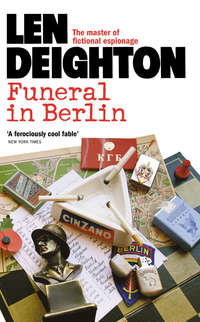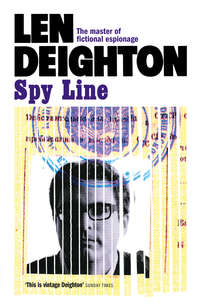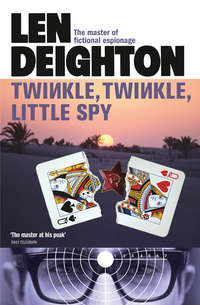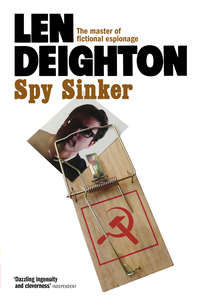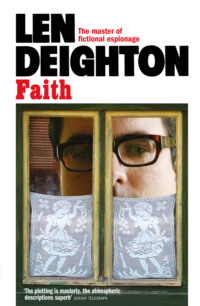
Полная версия
Billion-Dollar Brain

Cover designer’s note
The great challenge I faced when asked to produce the jackets for new editions of Len Deighton’s books was the existence of the brilliant designs conceived by Ray Hawkey for the original editions.
However, having arrived at a concept, part of the joy I derived in approaching this challenge was the quest to locate the various props which the author had so beautifully detailed in his texts. Deighton has likened a spy story to a game of chess, which led me to transpose the pieces on a chessboard with some of the relevant objects specified in each book. I carried this notion throughout the entire quartet of books.
Since smoking was so much part of our culture during the Cold War era, I also set about gathering tobacco-related paraphernalia. KGB officer Colonel Alexeyevitch Stok’s relish for caviar is only matched by his scholarly passion for the works of Robert Burns. A portrait of the poet sits beside a pack of Russian cigarettes illustrated with a map of the Soviet Union. The pack provides a haven for the ‘Red’ pawn.
During a visit to Moscow some years ago I returned with the small but hefty bust of Lenin. The revolutionary leader’s bronze head rests on a bed of computer punch-cards and a censored secret FBI file. A luggage label testifies to the book’s protagonist’s stay at Leningrad’s Hotel Europe, and a torn 5 Mark Finnish bank note provides a conventional ploy for our agent.
The cigarette cards on the back cover reflect the ever-present cricket match, and also the devotion to his vintage Riley motor car of George Dawlish, the public school-educated Senior British Intelligence officer and head of WOOC(P).
I photographed the jacket set-up using natural daylight, with my Canon OS 5D digital camera.
Arnold Schwartzman OBE RDI


Copyright
This novel is entirely a work of fiction. The names, characters and incidents portrayed in it are the work of the author’s imagination. Any resemblance to actual persons, living or dead, events or localities is entirely coincidental.
Published by HarperCollinsPublishers Ltd
1 London Bridge Street
London SE1 9GF
www.harpercollins.co.uk
First published in Great Britain by Jonathan Cape 1966
Copyright © Pluriform Publishing Company BV 1966
Introduction copyright © Pluriform Publishing Company BV 2009
Cover designer’s note © Arnold Schwartzman 2009
Cover design and photography © Arnold Schwartzman 2009
Len Deighton asserts the moral right to be identified as the author of this work
A catalogue copy of this book is available from the British Library
All rights reserved under International and Pan-American Copyright Conventions. By payment of the required fees, you have been granted the non-exclusive, non-transferable right to access and read the text of this ebook on screen. No part of this text may be reproduced, transmitted, down-loaded, decompiled, reverse engineered, or stored in or introduced into any information storage and retrieval system, in any form or by any means, whether electronic or mechanical, now known or hereinafter invented, without the express written permission of HarperCollins ebook
HarperCollinsPublishers has made every reasonable effort to ensure that any picture content and written content in this ebook has been included or removed in accordance with the contractual and technological constraints in operation at the time of publication
Source ISBN: 9780586044285
Ebook Edition © MARCH 2015 ISBN: 9780007342990
Version: 2017-05-22
Spring is a virgin, summer a mother, autumn a widow, winter a stepmother.
RUSSIAN PROVERB
Two mythical countries (Kalevala and Pohjola) fight a perpetual war. They both want a magic mill that grinds endless salt, corn and money. The most important figure in this conflict is an old man named Vainamoinen. He is a wizard and a wise man. He is also a musician and plays tunes upon the bones of a pike. Vainamoinen woos a lovely young girl, Aino, but she drowns herself rather than marry an old man.
KALEVALA (a Finnish folk epic)
Mr Paul Getty … is quoted as having said that a billion dollars is not worth what it used to be.
NUBAR GULBENKIAN
Contents
Cover
Cover designer’s note
Title Page
Copyright
Epigraph
Introduction
Billion-Dollar Brain: Secret File No. 4
Section 1: London and Helsinki
Chapter 1
Chapter 2
Chapter 3
Section 2: London
Chapter 4
Chapter 5
Chapter 6
Chapter 7
Section 3: Helsinki
Chapter 8
Chapter 9
Chapter 10
Section 4: Leningrad and Riga
Chapter 11
Chapter 12
Chapter 13
Chapter 14
Section 5: New York
Chapter 15
Chapter 16
Section 6: San Antonio
Chapter 17
Chapter 18
Chapter 19
Section 7: New York
Chapter 20
Section 8: London
Chapter 21
Chapter 22
Chapter 23
Section 9: Helsinki and Leningrad
Chapter 24
Chapter 25
Chapter 26
Section 10: London
Chapter 27
Chapter 28
Appendix One
Appendix Two
Appendix Three
Footnotes
Keep Reading
About the Author
By Len Deighton
About the Publisher
Introduction
‘Very few people go there. Even reporters who live there are restricted to the places they permit them to visit,’ said the lady in the travel agency. ‘And the organized bus tours are for sympathetic trade union people and party members. There would be lots of food and wine but you wouldn’t get to see anything much. You wouldn’t like that, would you?’
‘No,’ I said.
‘There is another way but we have never tried it. You have to pay for an interpreter who is with you all the time.’
‘Could I go where I liked?’
‘That’s what the Russians say. But your interpreter will be some kind of secret police stooge and it will be very expensive.’
‘I’ll try it.’
The lady in the travel agency was right about very few Westerners going to the Baltic States. And in the frozen depth of winter visitors were non-existent. But once there the frustrations, delays and stupidity that I had suffered in getting permission to go to Latvia proved worthwhile. This satellite of the Soviet Union, deep behind the iron curtain, and in a region the Russians considered strategically vital, was astonishing. The wartime England in which I’d grown up was a dismal and deprived place but visiting Riga at that time was like a giant step back in time. The people in wartime England had never lost their underlying optimism that one day the war would be won, and good times restored. But the city of Riga was a quite different environment; a large prison camp with an occupying Russian army arresting anyone who smiled.
My interpreter never smiled. Like ‘sinister KGB agent’ sent from Central Casting, she was a tall, middle-aged woman with the pale complexion that permanent winter confers. Her long fingers constantly fidgeted as they stroked her dark sable coat or adjusted the fit of an imposing hat of matching fur. In a country where opportunities for investment were few, valuable furs were not uncommon, but its possession still proclaimed her status. Sometimes she removed her hat to reveal hair tightly held in a bun by decorative hairpins. She puzzled about the sort of places I wanted to see as research for the book but after saving me a couple of times when I stepped out in front of speeding army trucks, and interceding when I made a rude sign to a traffic cop, she obviously decided that I was too stupid to be a spy. After a few days she went home each evening and left me to my own devices. I usually said I was going to a concert or to the opera. But an opera in Latvian is not easy to follow; trust me, I know.
But Latvia has its scenes and sights. Blizzards that lifted me off my feet, snow so thick it warped the landscape and cars driven far out upon the frozen sea were sights I shall never forget. I recalled the Teutonic Knights, heavy armour and flailing horses, crashing through the breaking ice in Eisenstein’s classic film, Alexander Nevsky. I could even hear Prokofiev’s music.
My plans for this book depended upon closely linked journeys. Places change drastically with the seasons and it could prove decisive. I had discovered this long ago, when visiting battlefields. A battle that might have been won by armies hidden in the foliage of summer was lost in winter when the trees were bare. And, if you crave the respect of your readers, describing Riga, New York City or Texas at a time of year other than when you saw it is fraught with danger. So if I was to be convincing I had to move when and where my characters would. Whizzing around the globe was nothing new to me; I had been an airline steward. The only difference was that now I had to pay my fare. I made pages and pages of notes, and this story closely follows my tracks. Mario is a real person and the Trattoria Terrazza was a real restaurant. Trinity Church Square is somewhere I used to live. Nowadays I regard such detailed and truthful reporting of people and places unsuited to fiction writing. I tell people that fiction writing requires the author to create a world, not just report on it. Reporting is something for newspapers and TV. Perhaps I have become a snob.
This was my fourth book and I needed to keep a close watch on the characters, some of whom had appeared in other books and might take part in future ones. Writing has always been hard work for me but I was beginning to enjoy the fun that made the hard work worthwhile. I am not a natural writer; I am a natural rewriter and rewriter and rewriter. I was desperately anxious to learn but I only wanted to learn how to get things the way I wanted them. If it all went wrong I could still go back to doing illustration jobs. Editors and publishers said my books were too cryptic; too fragmented and demanded too much of the reader. They all pressed me to conform to the orthodox methods of ‘popular fiction’. For instance: they were united in expecting a full description of each character at the first entrance. I resisted all this fiercely; I hadn’t followed any such rules in my previous books and I refused to be tied to them now. I reasoned that, just as one never gets to the end of discovering new aspects of old friends and relatives, so I wanted all my characters – even minor ones – to be more completely revealed as the story continued. And if that wasn’t difficult enough there is the necessity for interaction too. How did the characters see each other, and continually reappraise each other?
I enjoyed depicting characters, places and situations through the eyes, mind and prejudices of the main character. And I enjoyed undermining him by means of authorial asides, nudges and winks to the reader. He was an overdrawn egoist, I suppose. He jumped to conclusions, derided his fellow workers, ridiculed his superiors, exaggerated his successes and edited his failures and demanded far too much of his long-suffering friends. Despite his self-restraint he sometimes lost his temper; or almost lost it. Yet he gave his loyalty as readily as he demanded it, and he was fundamentally honest and adequately truthful. Was it a self portrait? No. A wishful one perhaps? Maybe it was.
When Conan Doyle created his Sherlock Holmes, he provided him with a Watson. I suppose this device was an old one, most story-telling devices are. But Doyle established the advantage of having a serious figure who, by means of dialogue, kept the plot on the rails and kept the reader informed. In previous books Dawlish, the boss, had been an austere icon of English middle-class probity. I had no Dawlish available for these world-wide wanderings. Harvey Newbegin, a minor character from Funeral in Berlin, my previous book, provides the second half of the double act for explanatory purposes. But few readers will hold hands with Harvey in the way that they would with Doyle’s Watson or my Dawlish. So who was there to like? The reader had only the hero. But as it turned out, I needn’t have worried. Despite his many faults the readers liked the hero, who after the films was called Harry Palmer. And Michael Caine’s brilliant depiction of him did a great deal to effect that.
Len Deighton, 2009
SECTION 1 London and Helsinki
See-saw, Margery Daw,
Jacky shall have a new master.
NURSERY RHYME
1
It was the morning of my hundredth birthday. I shaved the final mirror-disc of old tired face under the merciless glare of the bathroom lighting. It was all very well telling oneself that Humphrey Bogart had that sort of face; but he also had a hairpiece, half a million dollars a year and a stand-in for the rough bits. I dabbed a soda-stick at the razor nicks. In the magnifying mirror it looked like a white rocket landing on the uncharted side of the moon.
Outside was February and the first snow of the year. At first it was the sort of snow that a sharp PR man would make available to journalists. It sparkled and floated. It was soft yet crisp, like some new, sugar-coated breakfast cereal. Girls wore it in their hair and the Telegraph ran a picture of a statue wearing some. It was hard to reconcile this benign snow with the stuff that caused paranoia among British Railways officials. That Monday morning it was building up in crunchy wedges under the heels of shoes and falling in dry white pyramids along the front hall of the Charlotte Street office where I worked. I said ‘Good morning’ to Alice, and she said, ‘Don’t tread it in’ to me, which summed up our relationship nicely.
The Charlotte Street building was an ancient creaking slum. The wallpaper had great boils full of loose plaster and there were small metal patches in the floor where the boards were too rotten to repair. On the first-floor landing was a painted sign that said ‘Acme Films. Cutting Rooms’, and under that a drawing of a globe that made Africa too thin. From behind the doors came the noise of a moviola and a strong smell of film cement. The next landing was painted with fresh green paint. On one door a dog-eared piece of headed notepaper said ‘B Isaacs Theatrical Tailor’, which at one time I had considered very funny. Behind me I heard Alice puffing up the stairs with a catering-size tin of Nescafé. Someone in the dispatch department put a brass-band record on the gramophone. Dawlish, my boss, was always complaining about that gramophone, but even Alice couldn’t really control the dispatch department.
My secretary said, ‘Good morning.’ Jean was a tall girl in her middle twenties. Her face was as calm as Nembutal and with her high cheekbones and tightly drawn-back hair she was beautiful without working at it. There were times when I thought that I was in love with Jean and there were times when I thought that she was in love with me, but somehow these times never coincided.
‘Good party?’ I asked.
‘You seemed to enjoy it. When I left you were drinking a pint of bitter while standing on your head.’
‘You do exaggerate. Why did you go home alone?’
‘I have two hungry cats to support. Two thirty is definitely my bedtime.’
‘I’m sorry,’ I said.
‘Don’t be.’
‘Truly.’
‘Going with you to a party is to be there alone. You plant me down, go around chatting with everyone, then wonder why I haven’t met them all.’
‘Tonight,’ I said, ‘we’ll go to some quiet place for dinner. Just us.’
‘I’m taking no chances. Tonight I’m cooking you a birthday feast at the flat. I’ll give you all your favourite things.’
‘You will?’
‘To eat.’
‘I’ll be there,’ I said.
‘You’d better be.’ She gave me a perfunctory kiss – ‘Happy birthday’ – and leaned across and put a glass of water and two Alka Seltzer tablets on my blotter.
‘Why not put the tablets into the water?’ I asked.
‘I wasn’t sure if you could bear the noise.’
She unlocked my trays and began to work steadily through the great pile of paper-work. By midday we hadn’t made much impression upon it. I said, ‘We aren’t even keeping up with the incoming.’
‘We can start a “pending” tray.’
‘Don’t be so female,’ I said. ‘All that does is call some of it another name. Why can’t you go through it and handle some of it without me?’
‘I already did.’
‘Then sort out the “information onlys”, mark them for return to us and pass them on. That would give us a breathing space.’
‘Now who’s kidding himself?’
‘Can you think of something better?’
‘Yes. I think we should get a written directive from Organization to be sure we’re handling only files that we should handle. There may be things in this tray that are nothing to do with us.’
‘There are times, my love, when I think none of it is anything to do with us.’
Jean stared at me in an expressionless way that might have indicated disapproval. Maybe she was thinking about her hair.
‘Birthday lunch at the Trat,’ I said.
‘But I look awful.’
‘Yes,’ I said.
‘I must do my hair. Give me five minutes.’
‘I’ll give you six,’ I said. She had been thinking about her hair.
We lunched at the Trattoria Terrazza: Tagliatelle alla carbonara, Osso buco, coffee. Pol Roger throughout. Mario complimented me on having a birthday and kissed Jean to celebrate it. He snapped his fingers and up came Strega. I snapped my fingers and up came more Pol Roger. We sat there, drinking champagne with Strega chasers, talking, snapping fingers and discovering ultimate truth and our own infinite wisdom. We got back to the office at three forty-five and I realized for the first time how dangerous that loose lino on the stairs can be.
As I entered my office the intercom was buzzing like a trapped bluebottle. ‘Yes,’ I said.
‘Right away,’ said Dawlish, my boss.
‘Right away, sir,’ I said, slowly and carefully.
Dawlish had the only room in the building with two windows. It was a comfortable room, although overcrowded with pieces of not very valuable antique furniture. There was a smell of wet overcoats. Dawlish was a meticulous man who looked like an Edwardian coroner. His hair was grey moving towards white and his hands long and thin. When he read he moved his fingertips across the page as though getting a finer understanding from the sense of touch. He looked up from his desk.
‘Was that you falling down the stairs?’
‘I stumbled,’ I said. ‘It’s the snow on my shoes.’
‘Of course it is, my boy,’ said Dawlish. We both stared out of the window; the snow was falling faster, and great white snakes of it were wriggling along the gutter, for it was still dry enough to be lifted by the wind.
‘I’m just sending another 378 file to the PM. I hate this clearance business. It’s so easy to slip up.’
‘That’s true,’ I said, and was pleased that I didn’t have to sign that file.
‘What do you think?’ asked Dawlish. ‘Do you think that that boy is a security risk?’
The 378 file was a periodic review of the loyalty of S.1s – important chemists, engineers etc. – but I knew that Dawlish just wanted to think aloud, so I grunted.
‘You know the one I’m worried about. You know him.’
‘I’ve never handled his file,’ and as long as choice was concerned I’d make damned certain I didn’t. I knew that Dawlish had another nasty little bomb called the 378 file sub-section 14, which was a file about trade-union officials. At the slightest show of intelligent interest I would find that file on my desk.
‘Personally: what do you feel about him personally?’ asked Dawlish.
‘Brilliant young student. Socialist. Pleased with himself for getting an honours degree. Wakes up one morning with a suede waistcoat, two kids, job in advertising and a ten-thousand-quid mortgage in Hampstead. Sends for a subscription to the Daily Worker just so that he can read the Statesman with a clear conscience. Harmless.’ I hoped that reply carried the right blend of inefficient glibness.
‘Very good,’ said Dawlish, turning the pages of the file. ‘We should give you a job here.’
‘I’d never get on with the boss.’
Dawlish initialled a chit at the front of the file and tossed it into the out tray. ‘We have another problem,’ he said, ‘that won’t be solved as easily as that.’ Dawlish reached for a slim file, opened it and read a name. ‘Olaf Kaarna: you know him?’
‘No.’
‘Journalists who have well-placed, indiscreet friends call themselves political commentators. Kaarna is one of the more responsible ones. He’s Finnish. Comfortable.’ (Dawlish’s word for a private income.) ‘He spends a great deal of time and money collecting his information. Two days ago he spoke to one of our embassy people in Helsinki. Asked him to confirm a couple of small technical points before an article is published next month. He’s thinking of sending it to Kansan Uutiset, which is the left-wing newspaper. If it was something harmful to us, that would be a good place to set the fuses. Of course we don’t know what Kaarna has up his sleeve, but he says he can show that there is a vast British Military Intelligence operation covering northern Europe and centred in Finland.’ Dawlish smiled as he said this and so did I. The thought of Ross at the War Office master-minding a global network was a little unreal.
‘And the clever answer is …?’
‘Heaven knows,’ said Dawlish, ‘but one must follow it up. Ross will no doubt send someone. The Foreign Office have been told; O’Brien can hardly ignore the situation.’
‘It’s like one of those parties where the first girl to leave will have everyone talking about her.’
‘Quite so,’ said Dawlish. ‘That’s why I want you to go tomorrow morning.’
‘Wait a minute,’ I said. I knew there were all kinds of reasons why it was impossible, but the alcohol blurred my mind. ‘A passport. Whether we get a good one from the Foreign Office or a quick job from the War Office we will tip our hand and they will delay us if they want to.’
‘See our friend in Aldgate,’ said Dawlish.
‘But it’s four thirty now.’


